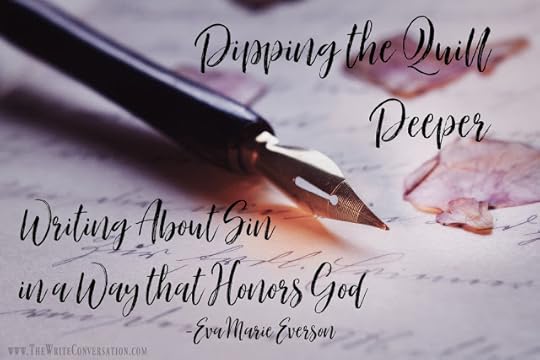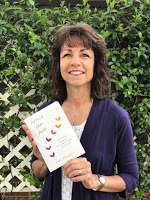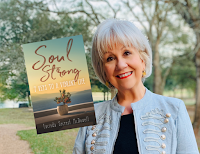Edie Melson's Blog, page 199
May 27, 2020
7 Traits of a Successful Writing Critique Group

by Henry McLaughlin @RiverBendSagas
I’m sure we’ve all participated in or heard stories about horrible experiences with critique groups. I’ve had a few myself. Unfortunately, I may also have contributed to some of them. To any writers I did this to, I apologize.
I’ve been writing seriously for over ten years. During this time, I’ve participated in many critique groups, both on line and in person. I’m honored and humbled to serve as a writing coach or mentor over numerous groups over the years.
As I’ve traveled this writing journey I’ve noticed that successful groups have certain character traits that distinguish them from the unsuccessful.
In no particular order the 7 traits are:
Honesty Members are gently honest in sharing their feedback and comments with each other. No holding back to spare someone’s feelings, yet learning to give feedback sensitively so the person can receive it without self-condemnation. And no personal attacks or attempts to dominate or make everyone write the same. Like workout partners, we help each other develop the thick skin necessary to make it in the writing world. As Proverbs says, we are iron sharpening iron.
Encouragement The group is a place where writers give and receive encouragement and support on the writing journey. The group provides a safe and confidential environment, a place where we share triumphs and rejections, struggles and breakthroughs.
Relationships We build relationships of trust and caring. We move from being group members to writing partners to friends.
Learning We learn the craft through practice and open and honest criticism. We share new insights and knowledge.
Challenging We call for each other to grow as writers. We won’t let talented writers settle for less. We won’t let struggling writers give up.
Consistency We show up on time, fully prepared to participate. We adhere to the established rules of the group and submit to the leadership. We learn the value of being writers who have discipline, who meet deadlines, and who put our butts in our chairs to write.
Safety and Trust Many authors write personal stories. Stories of pain, grief, abuse, addiction. Deeply.
At one group recently, an author shared how painful it was to hear someone else read her story. Not because the writing was bad but because the story was so real and alive in her still. She didn’t know if she could continue to write, never mind share it.
We encouraged her that the group was a safe place, a place we can share hurts and pains in life as well as in our writing. I believe, for this person, writing the story is part of her healing. Sharing it in the safety of a writers group will help that healing process. Even if her story is never published, it needs to be written.
What traits have you found that make for a good critique group?
TWEETABLE
7 Traits of a Successful Writing Critique Group - Henry McLaughlin, @RiverBendSagas on @EdieMelson (Click to Tweet)
 Henry’s debut novel, Journey to Riverbend, won the 2009 Operation First Novel contest.
Henry’s debut novel, Journey to Riverbend, won the 2009 Operation First Novel contest.Henry edits novels, leads critique groups, and teaches at conferences and workshops. He enjoys mentoring and coaching individual writers.
Connect with Henry on his blog, Twitter and Facebook.
Published on May 27, 2020 22:00
May 26, 2020
Why Writers Can’t Ignore the World Around Them

by DiAnn Mills @DiAnnMills
Many writers are introverts and prefer to ignore the world around them. Writers genuinely care about others but working in cave mode keeps them on task. A quiet place with a laptop is much more appealing than noisy crowds. I understand the writing preference because many times I’m right there with you. While working independently is admirable, there’s a flip side to a writer’s life that we should all take heed.Writers can’t address reader needs while neglecting the world around them.
Let’s explore 7 areas of writing to prove or disprove my point.
1. Nonfiction writing is about real events, people, places, history, and various sciences. They can be articles, textbooks, commentaries, or books. Every topic has a link or application for today.
If a writer doesn’t know what others are experiencing, their information will might miss the mark. 2. Fiction is about a character(s) journey to solve a problem or reach a goal. A writer creates a fully developed character who resembles reality to the reader. Wants, needs, victories, flaws and life experiences mirror the reader.
If a writer isn’t interested in people’s issues and problems, how can they entertain, inspire, or encourage readers?
3. Blogs are focused on addressing specific needs within a specialized topic. They inform, teach, entertain, and raise awareness for those interested in the subject.
If a writer does not understand what a reader needs, how can he/she create a dynamic and engaging post?
4. Devotions are spiritual aids resulting from in-depth study of a Biblical passage. They can explain, teach, encourage, and even convict the reader in clear and concise language. The writer hopes the reader will meditate on the devotion’s contents throughout the day.
A writer who has no idea what people are facing in their day-to-day lives or what is happening in the world that shakes their faith, may miss the best approach to resonate with readers.
5. Social media posts call attention to art, blogs, podcasts, images, videos, media information, and more. The post draws attention to the featured topic, enticing the reader to explore further.
If a writer foregoes what’s happening in their community, state, national, and world events, how can a social media post draw distinction?
6. Poetry uses words to express intense feelings and ideas about any subject. The writer uses unique styles and rhythms to showcase the piece. While a writer might not find value in keeping informed of life and happenings, how can they create a piece others will appreciate?
7. Biographies show us the life-history of people who have accomplished something noteworthy. These people come from every walk of life with one distinction: they achieved leadership and success by battling the odds against them.
A writer who pens a biography must consider why this person would be of interest. How can their challenges help or address a need today?
What are your thoughts? Are you ready to use your knowledge and expertise of the current world to help readers?
TWEETABLEWhy Writers Can't Ignore the World Around Them - @DiAnnMills on @EdieMelson (Click to Tweet)
 DiAnn Mills is a bestselling author who believes her readers should expect an adventure. She creates action-packed, suspense-filled novels to thrill readers. Her titles have appeared on the CBA and ECPA bestseller lists; won two Christy Awards; and been finalists for the RITA, Daphne Du Maurier, Inspirational Readers’ Choice, and Carol award contests.
DiAnn Mills is a bestselling author who believes her readers should expect an adventure. She creates action-packed, suspense-filled novels to thrill readers. Her titles have appeared on the CBA and ECPA bestseller lists; won two Christy Awards; and been finalists for the RITA, Daphne Du Maurier, Inspirational Readers’ Choice, and Carol award contests. She is the director of the Blue Ridge Mountain Christian Writers Conference, Mountainside Marketing Retreat, and Mountainside Novelist Retreat with social media specialist Edie Melson. Connect here: DiAnnMills.com
Published on May 26, 2020 22:00
May 25, 2020
Dipping the Quill Deeper – Writing About Sin in a Way that Honors God

by Eva Marie Everson @EvaMarieEverson
There is a story in the Bible—a shocking one—about a king standing on the roof of the palace. He sees a woman taking a bath—a purification bath, to be more specific—on the roof of another building. He has a desire for her. He asks about her, learns she is married, but he sends for her anyway. They “lay” together, and, in that life-altering night, they create a child. This leads to the murder of the woman’s husband, the marriage of our two key players, and the death of the baby they conceived. What do you notice about this story (I’ve pretty much given it to you the way the Bible lays it out)? What don’t you notice?
I’ll go ahead and answer my own question. What you notice is two adults engaging in a sinful act that leads to another sinful act and then the consequences of that sin (the death of the child). What you do not see are throbbing loins and heaving bosoms. You don’t see sweaty flesh on sweaty flesh. You do not see lips and tongues and you don’t hear sighs and groans of passion.
And, yet, all of this was probably there.
But we don’t need all of this, do we? We’re adults. You don’t have to give us a Slinky and tell us it’s a toy.
Here’s another story (and if you think the first story was shocking …) about a man who married his son to a woman, but the son was “wicked in the eyes of the Lord.” When the young couple copulated, the man “spilled his seed on the ground.” The Lord, clearly unhappy, took the life of the husband. So, according to the Leverite law, the next son was married to the widow. This son also did evil in the eyes of the Lord and “spilled his seed on the ground.” Exit husband #2. The father, clearly concerned about his younger son (who, according to the law, would have to marry the widow), told his daughter-in-law to go back to her father’s house until which time his baby boy was old enough to marry.
He had, of course, no intention of calling her back when the son grew up. Years went by and the widow hears that her mother-in-law has died. She also figures that the father-in-law has duped her; he is clearly not sending for her. So she does what any logical-thinking girl would do: she dresses like a prostitute, entices her father-in-law (which, by the way, was lawful), and the result is twins, one of which will bring the line of Messiah.
Somewhat scandalous, right? But guess what we do not see. That’s right, the bedroom details of this saga.
Final story, this one about a father and his two daughters. Before you are too disgusted, let me give you the backdrop. They had, at one time, lived in a city known for its sexual sin, mainly its homosexual sin. Three “men of God” showed up at the father’s door and he welcomed them in. Soon, when the men of the village heard about three strangers in town, they went over and demanded that he send the men out so they could “sleep with them.” (I guess they saw no need to try to hide their intentions.)
The father was so horrified, he offered his two virgin daughters. But the men demanded the strangers. The strangers (who were angels) blinded the men, saved the father, and then, knowing that God was about to destroy the city for its sin, told the father to take his young daughters and their mother and “leave Dodge.” They did, but, as the city was being destroyed, the wife looked back and became a “pillar of salt.” The father then took his daughters into a cave to live.
Time passed and the daughters, believing they were the only three people left on the planet, made some wine, gave it to their father, then slept with him in order to follow the commandment of God to “be fruitful and multiply.”
The two nations that rose from this awful story became the enemies of God’s people, the Moabites and the Ammonites.
As horrible and toe-curling as that story is, guess what you don’t see: you don’t see homosexual sex and you don’t see the incestuous acts between father and daughters. You know it’s there, yes, but there are no graphic words and phrases to keep you shuddering at night.
As the president of Word Weavers International and as a writing coach, I am often asked about presenting sin in works of fiction (and, sometimes, nonfiction). “How can we show redemption unless we show the details of sin?” they ask me.
Well, I believe I have demonstrated this. Pick up your Bible and read the stories of David & Bathsheba, Judah & Tamar, and Lot & his daughters to name a few. The writers of the Scriptures demonstrated how far mankind can go from God in their sin without titillating us or making us want to throw the book across the room.
We writers have been given a special gift: the ability to put words on paper and draw readers to truth in story. More importantly, as Christian writers, we draw them to the Truth. How can we do this if we allow ourselves to take an easy way out in our writing. Writing “smut” is easy but writing about the consequences of sin through story takes hard work. Finding the right words. Laying out the proper scenes.
I’ll say it again: we have been given a precious gift. Why would we want to cheapen it?
TWEETABLE
Dipping the Quill Deeper: Writing About Sin in a Way That Honors God - @EvaMarieEverson on @EdieMelson (Click to Tweet)
 Eva Marie Everson is the president of Word Weavers International and the director of its two conferences. She is the multiple award-winning author of nearly 40 works and has received awards as a speaker and Bible teacher. Eva Marie is often seen at writers conferences across the States. She served as a mentor for Jerry B. Jenkins’ Christian Writers Guild for several years, and taught as a guest professor at Taylor University in 2011. She and her husband make their home in Central Florida where they enjoy their grandchildren. They are owned by one small dog and a princess cat.
Eva Marie Everson is the president of Word Weavers International and the director of its two conferences. She is the multiple award-winning author of nearly 40 works and has received awards as a speaker and Bible teacher. Eva Marie is often seen at writers conferences across the States. She served as a mentor for Jerry B. Jenkins’ Christian Writers Guild for several years, and taught as a guest professor at Taylor University in 2011. She and her husband make their home in Central Florida where they enjoy their grandchildren. They are owned by one small dog and a princess cat.
Published on May 25, 2020 22:00
May 24, 2020
The Magic Paragraph for Writers

by Ane Mulligan @AneMulligan
The late Ron Benrey taught me—and many other writers—one of the best literary devices for grounding our readers in our stories. He called it "The Magic Paragraph." It plays a weighty role in my writing and is a basic in my toolbox. So much so, Ron's wife and my first literary agent, Janet Benrey, gave me permission to carry on the teaching. And sometimes, it's good to go back to the basics. So let's dive into this device:The Magic Paragraph:Signal which head to enterWrite an appropriate sense, emotion or mental facultyShow appropriate action or responseRepeat if necessary
Breaking that down, the first one is fairly self-explanatory. Begin by letting the reader know whose POV: Jane plopped her backside down on the curb.
We know we’re in Jane’s head. You don’t have to start with the name, but give it fairly soon, so the reader knows who it is. In one of my books, I started it this way:The morning fog was about as thick as the pea soup Great-aunt Lola used to make. Claire hated that soup then and she didn’t much like this fog now.
I give you Claire’s name in the second sentence. And the reader wouldn’t confuse the POV character with Great-aunt Lola, because she wouldn’t think of her soup in that way. In the Claire example above, I have both the first and second bullets of the magic paragraph in those two opening sentences. I signaled whose head to enter and then I recorded an appropriate sense, emotion or mental faculty for the character.
Here’s step 2 to follow Jane’s opening line:Her spirit was so low she could probably dangle her feet and not touch the water trickling in the gutter.
Next is to show an appropriate action: For Claire it’s: She swished her hand back and forth in an impotent attempt to dispel it. For Jane: She pulled a crumpled tissue from her pocket and blew her nose, wishing she could blow away her problems as easily.
The last item is Repeat if necessary. We need to keep the reader grounded in our POV character’s head. This little gadget, the Magic Paragraph, isn’t a formula per se. Remember, it’s a guide to keep our readers grounded and showing what’s in our character’s head. It will serve us well and take our readers on the journey with us, making them privy to our POV character’s innermost thoughts.
Jane plopped her backside down on the curb. Her spirit was so low she could probably dangle her feet and not touch the water trickling in the gutter. She pulled a crumpled tissue from her pocket and blew her nose, wishing she could blow away her problems as easily.
So there you have it, The Magic Paragraph. Use it to help keep your story and your reader grounded in your character’s POV.
Do you have a basic tool that you keep foremost in your mind when writing? Do share, please!
TWEETABLE
The Magic Paragraph for Writers - @AneMulligan on @EdieMelson (Click to Tweet)
 Ane Mulligan has been a voracious reader ever since her mom instilled within her a love of reading at age three, escaping into worlds otherwise unknown. But when Ane saw Mary Martin in PETER PAN, she was struck with a fever from which she never recovered—stage fever. She submerged herself in drama through high school and college. Years later, her two loves collided, and a bestselling, award-winning novelist emerged. She resides in Sugar Hill, GA, with her artist husband and a rascally Rottweiler. Find Ane on her website, Amazon Author page, Facebook, Twitter, Instagram, Pinterest and The Write Conversation.
Ane Mulligan has been a voracious reader ever since her mom instilled within her a love of reading at age three, escaping into worlds otherwise unknown. But when Ane saw Mary Martin in PETER PAN, she was struck with a fever from which she never recovered—stage fever. She submerged herself in drama through high school and college. Years later, her two loves collided, and a bestselling, award-winning novelist emerged. She resides in Sugar Hill, GA, with her artist husband and a rascally Rottweiler. Find Ane on her website, Amazon Author page, Facebook, Twitter, Instagram, Pinterest and The Write Conversation.
Published on May 24, 2020 22:00
May 23, 2020
Fry Count vs. A Life That Counts

by Rhonda Rhea @RhondaRhea
You know your marriage is strong when one of you gets home with the drive-thru order and the fries are missing but you still stay together. I’m not saying no one checks for fry-breath or anything, but still.
Sometimes you have to look at what counts. Because there are a couple of burgers left in there, right? No wait. What I mean to say is…healthy marriage. Important. That.I’m working to improve my life focus, keeping a handle on what’s important and ignoring a few more of the incongruities and inconsistencies of life. Isn’t it an ironic inconsistency, for instance, that hotdog buns come in packages of ten but I’m eating chocolate chips out of the bag instead?
And while we’re talking incongruities and hotdogs, please forgive me for this, but isn’t hotdog to meat as fifth grade band concert is to music?
Looking at what counts when it comes to soul nourishment is a much bigger deal. We can’t consistently consume spiritual greasy meat by-products, as it were, and expect to have a healthy faith life.
We are to draw our nourishment from Christ Himself. Not from every new fad or passing trend. Just Jesus. Paul challenges us in Colossians 2:6, “So then, just as you have received Christ Jesus as Lord, continue to live in him, being rooted and built up in him and established in the faith, just as you were taught,” (CSB). I love the paraphrase that says, “Let your roots grow down into him and draw up nourishment from him. See that you go on growing in the Lord, and become strong and vigorous in the truth you were taught,” (TLB).
Fries and hotdogs may come and go, but drawing nourishment—real truth and real nourishment—from Christ takes us to a deeper life. It’s a place of growth, strength, vigor!
Our fleshly tendencies are to focus on the things that don’t count and even to try to feed on those things. We should never expect anything but a starving soul and a weak and sickly faith on that kind of diet. Talk about leaving you empty. Paul speaks of it in the very next verse when he warns, “Be careful that no one takes you captive through philosophy and empty deceit based on human tradition, based on the elements of the world, rather than Christ,” (Colossians 2:8 CSB).
That kind of soul starvation leaves us empty and even enslaves us. Ever wake up in philosophy/deceit jail, having been taken “captive through philosophy and empty deceit”? It’s the incongruity of all incongruities to be set free from sin and death by our incomparable Savior, and then allow ourselves to be hauled back into this prison of worldly thinking, all of it based on men’s traditions and ideas instead of God’s truth.
Staying diligent about our focus, not letting it slip away from us into greasy half-truths that leave us tired, unfulfilled and off-track really is a big deal. It’s the reason Paul was Spirit-inspired to write this passage. Several verses earlier, he tells us exactly why he’s writing out these instructions for us: “I am saying this so that no one will deceive you with arguments that sound reasonable,” (Colossians 2:4, CSB).
So even if it sounds reasonable, let’s run every thought through the truth of God’s Word by the power of His Holy Spirit. A lot of those empty things we hear from the world that sound reasonable, in truth, just aren’t. Let’s keep our roots firmly planted in Jesus. Life tastes infinitely better right there. Seriously, what’s sweeter than finding our souls nourished—really nourished—by Him? Not all the fries in the land. Not even all the chocolate chips in the bag.
TWEETABLEFry Count vs. A Life That Counts - encouragement from @RhondaRhea on @EdieMelson (Click to Tweet)
 Rhonda Rhea is an award-winning humor columnist for great magazines such as HomeLife, Leading Hearts, The Pathway, and many more. She is the author of 19 books, including the popular romantic comedies co-authored with her daughter Kaley Rhea, Off-Script & Over-Caffeinated and Turtles in the Road. Rhonda and Kaley have also teamed up with Bridges TV host Monica Schmelter for the Messy to Meaningful books and TV projects. Along with Beth Duewel, Rhonda writes the Fix Her Upper series, and she also co-authored Unruffled: Thriving in Chaos with Edie Melson. She speaks at conferences and events from coast to coast, serves on many boards and committees, and stays busy as a publishing consultant. Rhonda says you can find her living near St. Louis drinking too much coffee and snort-laughing with her pastor/husband, five grown children, and five exceptional grandbabies.
Rhonda Rhea is an award-winning humor columnist for great magazines such as HomeLife, Leading Hearts, The Pathway, and many more. She is the author of 19 books, including the popular romantic comedies co-authored with her daughter Kaley Rhea, Off-Script & Over-Caffeinated and Turtles in the Road. Rhonda and Kaley have also teamed up with Bridges TV host Monica Schmelter for the Messy to Meaningful books and TV projects. Along with Beth Duewel, Rhonda writes the Fix Her Upper series, and she also co-authored Unruffled: Thriving in Chaos with Edie Melson. She speaks at conferences and events from coast to coast, serves on many boards and committees, and stays busy as a publishing consultant. Rhonda says you can find her living near St. Louis drinking too much coffee and snort-laughing with her pastor/husband, five grown children, and five exceptional grandbabies.
Published on May 23, 2020 22:00
May 22, 2020
I Double-Dog Dare You to Write

by Cathy Fyock @CathyFyock
Were you ever “double dog-dared?”
Plantation Swim Club in Louisville, KY has a 32 foot diving board that has been legendary for more than 50 years. As kids we would talk about the high-dive, and we would “double dog dare” our friends to commit to making that dive. As a kid, I had promised myself that if I ever got the chance to visit that pool, I WOULD jump off that diving board, even though I’ve always been afraid of heights. After all, I had been “double-dog-dared.”So when at age 12 I was invited to go to the pool with girlfriends, I knew that I WOULD make the jump!
I can recall climbing first to the 16 foot board on the way up, and making that jump, but only after about 15 minutes waiting to gather my nerve. You had to yell, “Hold up 32” when you were ready to jump so that the diver up top didn’t land on top of you, which made it even harder. But I made the jump, then climbed back up the ladder, beyond the 16 foot platform, to stand atop of the 32 foot tower.
I recall feeling terrified; and I also recall knowing that I would make the jump.
I stood there for at least 30 minutes. I would almost gather my courage, and at that moment I’d hear a call “Hold up 32” from the 16 foot platform. So I waited. Finally, I yelled, “Hold up 16” and made my jump. Wow. I was so excited, so relieved, so delighted that I had made that jump. All these years later I recall my exhilaration!
And now, all these years later, I think about that jump as I work with first time authors who are terrified at taking the leap of faith and letting go of their stories.
Why are they terrified? In a word: fear.
What do we fear as authors? We fear being laughed at, being rejected for our beliefs and values, of being criticized. We also fear being exposed, at being called an imposter.
What is it that authors can do to step beyond their fear and not just write but publish?
I think my role as a book coach is to “double dog dare you” into writing and publishing. I believe that we need to sometimes do really scary things in order to grow and learn. And I believe that writing is the path that leads to thought leadership.
So what about you? Are you thinking about writing but not quite ready to make it happen? Are you hesitating to pick up your pen and make the plunge?
I double dog dare you.
TWEETABLEI Double-Dog Dare You to Write - Encouragement from @CathyFyock on @EdieMelson (Click to Tweet)
 Cathy Fyock is The Business Book Strategist, and works with professionals and thought leaders who want to write a book as a business development strategy. Since starting her business as a book coach in 2014, she has helped more than 160 professionals become published authors. Her most recent book is The Speaker Author: Sell More Books and Book More Speeches. She can be reached at cathy@cathyfyock.com or 502-445-6539.
Cathy Fyock is The Business Book Strategist, and works with professionals and thought leaders who want to write a book as a business development strategy. Since starting her business as a book coach in 2014, she has helped more than 160 professionals become published authors. Her most recent book is The Speaker Author: Sell More Books and Book More Speeches. She can be reached at cathy@cathyfyock.com or 502-445-6539.
Published on May 22, 2020 22:00
May 21, 2020
15 Tips for Hosting a Successful Facebook Live Book Launch Party
 by Lori Hatcher @LoriHatcher2
by Lori Hatcher @LoriHatcher2Last month, in 5 Reasons You Should Host a Facebook Live Book Launch Party , I shared how, because of the pandemic, I had to postpone my in-person book launch party and instead launch Refresh Your Faith, Uncommon Devotions from Every Book of the Bible with a Facebook Live event. In addition to being fun, a Facebook Live event was easy for people to attend, relatively inexpensive, required no special equipment, and reached people who wouldn’t or couldn’t come to an in-person event. Like any other promotional event, a little planning goes a long way.
If you’re planning a book launch in the near future or simply gathering information, I hope you’ll consider adding a Facebook Live launch party to your list of promotional ideas. If you’ve done a FB Live launch, please share your best tips in the comments below.
Next month I’ll share 10 components of a successful Facebook Live launch party that you can adapt for your event. Stay tuned!
TWEETABLE
15 Tips for Hosting a Successful Facebook Live Book Launch Party - @LoriHatcher2 on @EdieMelson (Click to Tweet)
 Lori Hatcher loves to teach, train, and encourage writers by sharing what others have generously shared with her. She’s the author of several devotional books including
Refresh Your Faith – Uncommon Devotions from Every Book of the Bible
and
Hungry for God … Starving for Time, Five-Minute Devotions for Busy Women
, the 2016 Christian Small Publisher Book of the Year. The editor of
Reach Out, Columbia
magazine, she’s also a blogger, writing instructor, and inspirational speaker. You’ll find her pondering the marvelous and the mundane on her blog, Hungry for God. . . Starving for Time . Connect with her on Facebook, Twitter (@LoriHatcher2), or Pinterest (Hungry for God).
Lori Hatcher loves to teach, train, and encourage writers by sharing what others have generously shared with her. She’s the author of several devotional books including
Refresh Your Faith – Uncommon Devotions from Every Book of the Bible
and
Hungry for God … Starving for Time, Five-Minute Devotions for Busy Women
, the 2016 Christian Small Publisher Book of the Year. The editor of
Reach Out, Columbia
magazine, she’s also a blogger, writing instructor, and inspirational speaker. You’ll find her pondering the marvelous and the mundane on her blog, Hungry for God. . . Starving for Time . Connect with her on Facebook, Twitter (@LoriHatcher2), or Pinterest (Hungry for God).
Published on May 21, 2020 22:00
May 20, 2020
Increase Your Website Traffic with Pinterest

by Susan U. Neal RN, MBA, MHS @SusanNealYoga
Social media is a powerful business tool, but not everyone uses it effectively. Driving traffic to your website is vital to your success as an author. Over the years I’ve worked on improving my reach and engagement on Facebook, Twitter, LinkedIn, Instagram, and Pinterest. The platform I found the most success with, other than Facebook, has been Pinterest. I will share my journey in hopes that you will learn how to increase your website views through Pinterest.Website TrafficOver the past six months my website views have increased fivefold. I obtained these results by adding three to four visually appealing Pinterest pins to my blogs. In addition, I hired a social media strategist to manage my Pinterest account. She uses the social media scheduler called Tailwind to regularly post my blog’s new pins to my Pinterest page. Pinterest wants you to do more than merely pinning other people’s pins; they want you to create new pins. And when you do, your account will benefit from the Pinterest algorithm.
My monthly Pinterest viewers increased from 2,000 to 1,500,000 in eight months! Pinterest is a search engine, and it is a superb social media platform. For those of you who are artistic, you can create your own pins on Canva.com. It takes a creative person to design visually appealing graphics. Some people have that talent, and some people don’t. That’s why I hired a social media manager to create mine. Coming up with strong keywords for the title of your pin is also crucial.
Blog Post PinsThe next tactic I employed to increase my website views was writing blogs specific to current issues and creating corresponding Pinterest pins. Within Pinterest people click on my pins which drives traffic to my website. This is a list of my blog titles during the pandemic and website views that came from each blog’s pins:Fight the Coronavirus with these 10 Immune Boosting Tips (121 website clicks in 52 days)16 Best-Selling Books to Read in 2020 (2714 website clicks in 48 days)Fight Stress Eating with Healthy Snacks (13 website clicks in 33 days)12 Creative and Healthy Breakfast Ideas (38 website clicks in 13 days)10 Best Audiobooks to Listen to in 2020 (recently published)
My monthly Pinterest views were already up because I had employed the social media manager for six months. Five months ago my monthly website views were 492 (December 2019). Last month (April 2020) my website views were 2648. What a difference! No wonder I sold over 800 copies of my book 7 Steps to Get Off Sugar and Carbohydrates in April.
Popular Blog PostsPinterest is also a great way to determine what topics are trending. Go to your Pinterest account and click on the search bar. A drop-down menu appears with the following categories: “Ideas for You” and “Popular on Pinterest.” You could write a new blog post from one of these ideas.
Since I knew that my blog post, 16 Best-Selling Books to Read in 2020, drove loads of traffic to my website, I decided to create another blog about audiobooks: 10 Best Audiobooks to Listen to in 2020. Hopefully, it will be as beneficial. You don’t know which blog post or book will be a hit, but you can use strategies to determine what consumers want to read.
TrackingI keep track of the marketing strategies that I employ on a spreadsheet by listing the number of website views that come from that blog or article. This helps me to understand what is driving traffic to my site. Since my Pinterest account is a business account, Pinterest tracks all my statistics for each pin, website clicks, impressions, etc.
If you haven’t invested time in managing your Pinterest account and added beautifully designed Pinterest pins to your blogs, I suggest you start now. For my healthy living genre, I found Pinterest to be more effective at driving traffic to my website than Instagram or Twitter. You would need to figure out where your target audience hangs out. None of these social media platforms takes the place of the giant—Facebook—which is where most of my readers congregate. However, through focusing on Pinterest my book sales soared. If you’re looking for a Pinterest strategist, check out Brooke Neal by clicking here. If you want to learn how to manage Pinterest she is creating a course.
TWEETABLE
Increase Your Website Traffic with Pinterest - @SusanNealYoga on @EdieMelson (Click to Tweet)
 Susan U. Neal, RN, MBA, MHSSusan’s mission is to improve the health of the body of Christ. She has her RN and MBA degrees, as well as a master’s in health science. She is a CERTIFIED HEALTH AND WELLNESS COACH with the American Association of Christian Counselors. She published five books, the Selah award winner 7 STEPS TO GET OFF SUGAR AND CARBOHYDRATES, CHRISTIAN STUDY GUIDE FOR 7 STEPS TO GET OFF SUGAR AND CARBOHYDRATES, HEALTHY LIVING JOURNAL, SCRIPTURE YOGA a #1 Amazon best-selling yoga book, and YOGA FOR BEGINNERS which ranked #3. She published two sets of Christian Yoga Card Decks and two Christian Yoga DVDs that are available at CHRISTINAYOGA.COM. Her digital product HOW TO PREVENT, IMPROVE, AND REVERSE ALZHEIMER’S AND DEMENTIA is a great resource. To learn more about Susan visit her website SUSANUNEAL.COM You can also connect with Susan on FACEBOOK, TWITTER, and INSTAGRAM.
Susan U. Neal, RN, MBA, MHSSusan’s mission is to improve the health of the body of Christ. She has her RN and MBA degrees, as well as a master’s in health science. She is a CERTIFIED HEALTH AND WELLNESS COACH with the American Association of Christian Counselors. She published five books, the Selah award winner 7 STEPS TO GET OFF SUGAR AND CARBOHYDRATES, CHRISTIAN STUDY GUIDE FOR 7 STEPS TO GET OFF SUGAR AND CARBOHYDRATES, HEALTHY LIVING JOURNAL, SCRIPTURE YOGA a #1 Amazon best-selling yoga book, and YOGA FOR BEGINNERS which ranked #3. She published two sets of Christian Yoga Card Decks and two Christian Yoga DVDs that are available at CHRISTINAYOGA.COM. Her digital product HOW TO PREVENT, IMPROVE, AND REVERSE ALZHEIMER’S AND DEMENTIA is a great resource. To learn more about Susan visit her website SUSANUNEAL.COM You can also connect with Susan on FACEBOOK, TWITTER, and INSTAGRAM.
Published on May 20, 2020 22:00
May 19, 2020
10 Tips for Irresistible Writing, Part 2

by Katy Kauffman @KatyKauffman28
Connection. We want it during a pandemic. We want to feel connected to people we care about but can’t see in person. To stay grounded in an uncertain time through friendship and interaction. Even if it’s on Zoom.
We also want connection in the book world—authors connecting with readers and readers connecting with their favorite authors. We can connect through social media, emails, and websites, but an ongoing connection that we can never take for granted is the one we build with readers in our books. We build a rapport with them through what we say and how we say it. This month I continue my miniseries of ten tips for irresistible nonfiction writing. In this post, you’ll find two tips that focus on our writing voice (how we’re conveying our message), and next month I'll share two tips that focus on takeaway (the essential “what” of our message). If you missed the first post in the series, visit 10 Tips for Irresistible Writing, Part 1.
How can we create irresistible writing that builds a powerful connection with our readers?
Tip #4: Don’t assume your reader is doing something wrong.
Bam, bam, bam. We can tell when an author is getting on our case, can’t we? It comes through in their tone and wording. They may genuinely want us to be better and do better. But is a guilt trip the best way to promote change?
I’m amazed at the patience of God. I can sit in silence before Him, grateful for the thousands of times He has shown me the truth gently, steadily, and in new ways. Sometimes I have needed “a good talking to,” but it appears that God’s preferred method of transformation is a daily love that manifests itself in truth taught, grace given, and faithfulness expressed.
So how can we address a felt need and at the same time give the reader some breathing space when they don’t have a particular problem? Or when they are growing? We can speak to them as a friend, use an encouraging voice, and include key words that show we’re giving them some credit. We use words like “can” or “may” to show that we could all have this problem, but as the author, we’re not assuming it’s theirs. We also remember words like “sometimes” or “often” to show that this problem happens, but perhaps not all the time in the reader’s life or our own.
For example, I might say something like this in a paragraph about breaking harmful habits—“Bad habits are like deep ruts in the road that are difficult to escape. As we navigate our way through life, we may find ourselves caught in one.”1 As the author, I included myself in the rut, and I didn’t assume the reader was caught in one too. (We “may” find ourselves in one.) An encouraging voice never excuses sin, but it brings God’s grace into the message and doesn’t use condemnation as a tool for change.
Tip #5: Never divorce your writing from emotion.
Years of writing college papers and reading emotionless textbooks trained my brain to write factually. Four years after I graduated college, I went through a different version of graduate school—learning to write conversationally. My first Bible study took me three years on and off to write. My biggest struggle, besides setting aside time to write, was my voice. How was I supposed to write about Scripture without sounding like a textbook?
Irresistible writing not only appeals to the mind but to the heart. Emotion is our ally in stirring a soul to break free, seek healing, let go, hold on, or whatever it is we’re inspiring our readers to do. Writing that is infused with emotion builds a heart connection between author and reader.
We infuse emotion into our writing by the stories we share, the details we include, the words we choose, and the cadence we possess. Sometimes we can share personal stories that show our inward struggles and build a rapport with readers who can relate to what we’ve been through. They’ll want to see how we survived and how God helped us. The words we choose can display the passion we feel about our message and the overwhelming delight, peace, or relief that God’s Word brings to our hearts. Our word choice can also move readers to put God’s Word and our application of it into action. Our cadence of sentences and phrases can create a crescendo of takeaway, trumpeting our call to heart transformation, or it can dissolve into a whisper of comfort that says, “I’ve been there too, and God is always with you.”
Which of the two tips above do you most often use to build a connection with your readers? Tell us in the comments below, and join the “connected” conversation!
1 Katy Kauffman, Breaking the Chains: Strategies for Overcoming Spiritual Bondage (Buford, Georgia: Lighthouse Bible Studies, 2017), 40.
TWEETABLE10 Tips for Irresistible Writing, cont. - @KatyKauffman28 on @EdieMelson (Click to Tweet)
Don't Miss the Rest of the Series!
10 Tips fro Irresistible Writing, Part 1
 Katy Kauffman is an award-winning author, an editor of Refresh Bible Study Magazine, and a co-founder of Lighthouse Bible Studies. She loves connecting with writers and working alongside them in compilations, such as Feed Your Soul with the Word of God, Collection 1 which is a 2020 Selah Awards finalist. Lighthouse’s newest compilation, The Power to Make a Difference, released January 2020.
Katy Kauffman is an award-winning author, an editor of Refresh Bible Study Magazine, and a co-founder of Lighthouse Bible Studies. She loves connecting with writers and working alongside them in compilations, such as Feed Your Soul with the Word of God, Collection 1 which is a 2020 Selah Awards finalist. Lighthouse’s newest compilation, The Power to Make a Difference, released January 2020. In addition to online magazines, Katy’s writing can be found at CBN.com, thoughts-about-God.com, the Arise Daily blog, and two blogs on writing. She loves spending time with family and friends, making jewelry, and hunting for the best donuts. Connect with her at her blog, The Scrapbooked Bible Study, and on Facebook and Twitter.
Published on May 19, 2020 22:00
May 18, 2020
Staying S.T.R.O.N.G. as a Writer

by Lucinda Secrest McDowell @LucindaSMcDowel
How has the pandemic and quarantine affected your life as a writer and speaker? I can imagine some of your answers because they are probably similar to some of mine: cancellations, uncertainty, inertia, and trying out new ways of communicating. Everything that exacerbates our weakness, not our strength.Things are changing constantly during this world health crisis and no matter what our profession, we are going to have to stay flexible and make wise choices. To acknowledge hard truths and still live vibrantly in our new normal. We go deeper than just surface responses – we garner strength of soul within to help us face the challenges without.
Here are some ways I’m seeking to Stay Strong as a Writer:S – Surrender Your Plans. “Give all your worries and cares to God, for He cares about you.” 1 Peter 5.7
This is not the life you signed up for, but it’s the life you have right now. As many things get smaller (event opportunities, activities, finances) or non-existent, it won’t help to feed fears. Instead, try to hold all loosely – your professional plans, your loved ones, your need-to-control. Try this simple exercise: Open your hands to release all that to God by naming each one, “Lord, I release _______ to You.” Then, keep your hands open to receive what God will give in return, “Lord, I receive Your gift of _________.”
T – Trust God’s Presence, Peace, and Power. “For I hold you by the right hand – I, the Lord your God. And I say to you, ‘Don’t be afraid. I am here to help you.’” Isaiah 41.13
God is the Creator and Sustainer of the universe who loves you more than you can possibly imagine. He is not wringing his hands in despair. He is, in fact, present through His Spirit – and nothing is impossible for Him. Can you say with King David, “When I am afraid, I will put my trust in You?” (Psalm 56.3) In the Bible God promises each of us His presence, peace, and power. You are not alone! Use this enforced withdrawal time to be in His presence more, filling up with His power and peace that you will eventually share with others in remarkable ways.
R – Reach Out with Kindness. “Be kind and compassionate to one another.” Ephesians 4.32
Tight spaces, deprivation, and anxiety can easily lead to bad tempers and self-centeredness. The perfect antidote is to make a deliberate choice to extend kindness to those in your household and community. Offer some writing or speaking services online as a free gift – just to serve others and make new connections. Think outside the box of how to show compassion to the servers and the suffering. Your light in the darkness will encourage, provide practical help, and bring hope.
O – Observe a Daily Routine. “Let me hear of Your unfailing love each morning, for I am trusting You. Show me where to walk, for I give myself to You.” Psalm 143.8
Awaken each day, get dressed, and make your bed. This and other established routines will provide security and order to your household. Limit your intake of media and news. Use your most alert and creative time to at least write in your journal or brainstorm some new topics, or start researching something you’ve never had time to pursue. Who knows what might come of those planted seeds – even a book or new retreat series? Plan exercise, meals, reading, rest, chores, schooling, daily check-in phone calls, and projects. Hugs and listening to your children will go a long way to help them know you are their ‘safe place.’ How you handle this crisis may well be your last and greatest legacy.
N – Nurture Your Inner Life. “Guard your heart above all else, for it determines the course of your life.” Proverbs 4.23
Take care of yourself – body and soul. Yes, do all the health mandates for physical safety. But also focus on your inner life through silence, prayers, Bible study, worship, rest, journaling, and those creative activities that renew and refresh. In addition to my morning prayers, I also have a hot cup of fresh brewed tea every afternoon with a favorite devotional book. Fill up your soul with deposits of that which is “true, honorable, lovely, pure, right, admirable, excellent, and worthy of praise.” (Philippians 4) Your strength of soul will then overflow to others. Please be okay with no writing productivity if that’s how your life is right now because you are sick, caring for others, or just too distracted. God is present at all times and in all seasons.
G – Give Thanks Daily. “Let the peace of Christ rule in your hearts. And be thankful.” Colossians 3.15
No matter how bad life gets, there are always blessings. Look for the gifts you have. Name them. Rather than complaining about not hearing from publishers on that book proposal, why not start blogging again? Make a gratitude list each day and then offer up thanks to the God who provides. Be generous to others. Say “Thank You” to those who rarely hear it and pray for them. And then, embrace the peace that God promises to bring to your own heart and life.
I confess, I don’t feel very strong some days. And if someone else tells me that Shakespeare wrote his best plays during quarantine, I think I will scream! But, by God’s grace, I am determined to live vibrantly through these unknown and unprecedented times as a soul strong woman. This is my prayer for you as well.
TWEETABLEStaying S.T.R.O.N.G. as a Writer - encouragement from @LucindaSMcDowel on @EdieMelson (Click to Tweet)
 Lucinda Secrest McDowell, M.T.S., is a storyteller and seasoned mentor who engages both heart and mind while
“Helping you Choose a Life of Serenity & Strength.”
A graduate of Gordon-Conwell Theological Seminary and Furman University, McDowell is the author of 15 books and contributing author to 30+ books. Her award-winning books include
LIFE-GIVING CHOICES
,
SOUL STRONG
(2020),
DWELLING PLACES
(2017 Christian Retailing BEST Award for Devotional),
ORDINARY GRACES
(2018 Selah Finalist),
LIVE THESE WORDS
, and
Refresh!
Lucinda, a member of the REDBUD WRITERS GUILD, received Mt. Hermon “Writer of the Year” award and guest blogs for The Write Conversation, Blue Ridge Mountains Christian Writers Conference Blog and (in)courage. Whether co-directing
“RENEW ~ RETREAT FOR NEW ENGLAND WRITING,”
pouring into young mamas, or leading a restorative day of prayer, she is energized by investing in people of all ages. Lucinda’s favorites include tea parties, good books, laughing friends, ancient prayers, country music, cozy quilts, musical theatre, and especially her family scattered around the world doing amazing things. Known for her ability to convey deep truth in practical and winsome ways, she writes from “Sunnyside” cottage in New England and blogs weekly at
https://lucindasecrestmcdowell.com/
Follow Lucinda on Twitter: @LUCINDASMCDOWEL
Lucinda Secrest McDowell, M.T.S., is a storyteller and seasoned mentor who engages both heart and mind while
“Helping you Choose a Life of Serenity & Strength.”
A graduate of Gordon-Conwell Theological Seminary and Furman University, McDowell is the author of 15 books and contributing author to 30+ books. Her award-winning books include
LIFE-GIVING CHOICES
,
SOUL STRONG
(2020),
DWELLING PLACES
(2017 Christian Retailing BEST Award for Devotional),
ORDINARY GRACES
(2018 Selah Finalist),
LIVE THESE WORDS
, and
Refresh!
Lucinda, a member of the REDBUD WRITERS GUILD, received Mt. Hermon “Writer of the Year” award and guest blogs for The Write Conversation, Blue Ridge Mountains Christian Writers Conference Blog and (in)courage. Whether co-directing
“RENEW ~ RETREAT FOR NEW ENGLAND WRITING,”
pouring into young mamas, or leading a restorative day of prayer, she is energized by investing in people of all ages. Lucinda’s favorites include tea parties, good books, laughing friends, ancient prayers, country music, cozy quilts, musical theatre, and especially her family scattered around the world doing amazing things. Known for her ability to convey deep truth in practical and winsome ways, she writes from “Sunnyside” cottage in New England and blogs weekly at
https://lucindasecrestmcdowell.com/
Follow Lucinda on Twitter: @LUCINDASMCDOWEL
Published on May 18, 2020 22:00



